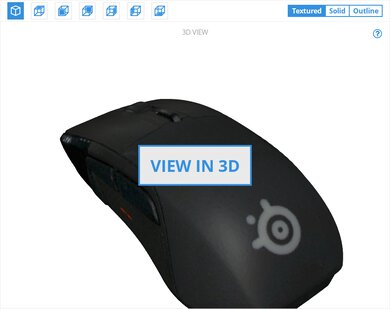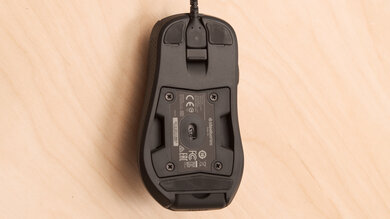The SteelSeries Rival 710 is a good overall gaming mouse and features a customizable and quite unique OLED screen at the front of the body. The mouse is fairly heavy and great for people who prefer using a palm grip. It's comfortable to use for long periods and its performance is excellent. You can easily customize the RGB lighting or the performance settings inside the Engine 3 software, which is compatible with both Windows and macOS. Unfortunately, the cable is quite stiff and creates drag when moving the mouse around.
Our Verdict
The SteelSeries 710 can be a good office mouse. It's very well-built, feels solid, on top of being very comfortable, especially if you use a palm grip. Unfortunately, it can't be used wireless so you need to manage the stiff cable, but overall, it can be a nice addition to your desk.
- Very solid build quality.
- Comfortable design for palm grip.
- Excellent performance.
- Wired-only connection.
The SteelSeries Rival 710 is a pretty decent FPS mouse. Its click latency is quite low and it feels very responsive. You can also easily swap out its sensor by unscrewing it, which is a unique feature on a mouse. It might not be the lightest mouse for quick movements, but if you don't mind a heavier mouse, you shouldn't have any problems, other than the stiff cable.
- Very solid build quality.
- Comfortable design for palm grip.
- Excellent performance.
- Programmable vibrating alerts.
- Heavy mouse.
- Mediocre cable.
The SteelSeries Rival 710 is a very good gaming mouse for MMOs, although it doesn't have as many side buttons as dedicated MMO mice. It's also very comfortable to use and feels very responsive thanks to its low click latency. Some might be disappointed by the lack of scroll wheel tilt inputs, but overall, it's a solid choice if you casually play MMO games.
- Very solid build quality.
- Comfortable design for palm grip.
- Excellent performance.
- Programmable vibrating alerts.
- Only three side buttons.
- Mediocre cable.
The SteelSeries Rival 710 isn't designed for ultra-light gaming. The mouse is very heavy and most of the weight seems to be at the back of the body. While it's a good overall gaming mouse, it won't be the best option if you're looking for something light.
- Very solid build quality.
- Comfortable design for palm grip.
- Excellent performance.
- Programmable vibrating alerts.
- Heavy mouse.
- Mediocre cable.
The SteelSeries Rival 710 isn't designed to travel. This gaming mouse is wired-only and can be a little too big to bring on the go. This mouse should stay at home with your gaming setup.
- Very solid build quality.
- Comfortable design for palm grip.
- Excellent performance.
- Heavy mouse.
- Wired-only connection.
Changelog
- Updated Oct 19, 2020: Converted to Test Bench 1.0.
- Updated Jul 07, 2020: Review published.
- Updated Jun 30, 2020: Early access published.
- Updated Jun 16, 2020: Our testers have started testing this product.
Check Price
Popular Mouse Comparisons
The Steelseries 710 is a pretty straightforward gaming mouse that comes with a few unique features like an unscrewable sensor and a customizable OLED screen to access customization options. It's quite similar in design to other Rival mice from SteelSeries like the SteelSeries Rival 500, although it has fewer side buttons. If you want more options, check out our recommendations for the best gaming mice. If you prefer having less clutter on your desk, check out the best wireless gaming mice, and if you're on a budget, you can take a look at the best cheap gaming mice.
The Razer DeathAdder Elite is a better wired mouse for FPS gaming than the SteelSeries Rival 710. The Razer is much lighter and is better suited for people with small hands. Its CPI range is also more consistent and easier to fine-tune as you can adjust it by increments of 1. On the other hand, the SteelSeries feels a bit more comfortable, and its companion software is fully compatible with macOS and Windows, as opposed to Razer's Synapse 3, which is only compatible with Windows.
The SteelSeries Sensei Ten is a better wired FPS gaming mouse than the SteelSeries Rival 710. The Sensei Ten is better suited for a claw grip regardless of hand size and has a wider and more adjustable CPI range. It also has one more programmable side button than the Rival 710 and is lighter. On the other hand, the Rival 710 is much more comfortable and feels better-built.
The SteelSeries Rival 600 is a better wired gaming mouse than the SteelSeries Rival 710. The Rival 600 comes with eight 4-gram weights, so you can fully customize its weight. Its right-handed ergonomic slant makes it more comfortable than the Rival 710 as well, and it's well-suited for all grip types for everyone except those with small hands. Its click latency is lower than the Rival 710, and it has a lower liftoff distance. On the other hand, the 710 has a higher max CPI, though most people will likely find it too sensitive when used at its highest CPI.
The Razer DeathAdder V2 is a better gaming mouse than the SteelSeries Rival 710. The Razer is quite a bit lighter and is a great fit for most hand sizes and grip types. It has a wider CPI range, a lower lift-off distance, and a much better click latency. It also has twice as many programmable inputs if you set an HyperShift button. That said, the SteelSeries has one extra side button and features a unique OLED screen to display in-game stats or an image of your choice. However, it’s not recommended for a fingertip grip.
Test Results


The SteelSeries Rival 710 looks quite a bit like the SteelSeries Rival 500, but with fewer buttons. It has rubberized grips on the side and features a more typical FPS layout with three side buttons. It features RGB lighting on the scroll wheel and the logo situated on the back hump of the mouse. There’s also a unique OLED screen at the front of the body. It can be used to display in-game stats, an image or gif of your choice, and you can easily access configuration settings to customize your mouse without using its software.

The SteelSeries 710 isn’t very portable. This wired-only mouse won’t be ideal for working in small places like on a plane. It’s aimed to stay at home with your gaming setup.
This mouse is very heavy. There are no real weight optimization options, and it feels very back heavy overall. For a lighter mouse, check out the BenQ Zowie ZA11-B.

This mouse feels very well-built, just like most SteelSeries mice. The textured side grips are a nice touch and overall, the mouse feels solid. Unfortunately, the mouse clicks are a little wobbly, and there’s a small part at the top of the right-click button that doesn’t register any inputs, which can be a bit frustrating if your fingers rest more towards the front edge of the mouse.
The SteelSeries Rival 710 is very comfortable to use. It’s designed for right-handed people with a rounded shape that is mainly aimed for a palm grip. Its overall shape seems quite similar to the SteelSeries Rival 600 and becomes wider at the back. If you're interested in a mouse with similar performance and a thumb rest, check out the ROCCAT Kone AIMO Remastered.
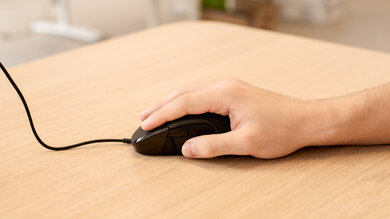
The palm grip is recommended for this mouse due to its rounded and wide shape. However, people with smaller hands might have trouble using this mouse with a palm grip as the vertical side button can be a bit hard to reach. If you want a mouse better suited for small hands, check out the BenQ ZOWIE ZA12-B.
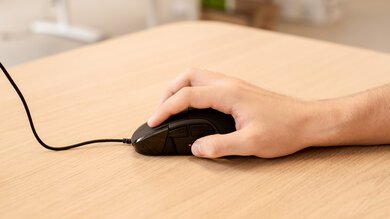
Only people with larger hands might find the claw grip to be effective and comfortable with this mouse. The vertical sniper button is also quite far from your thumb with this grip, so it's a bit harder to reach if you have smaller hands.
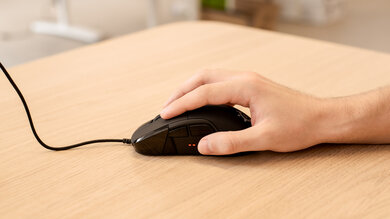
This mouse is definitely not designed to be used with a fingertip grip. Reaching the front side button is very hard and this grip doesn’t allow for good control over the mouse.
This mouse is wired-only and can’t be used wirelessly.
The SteelSeries Rival 710’s cable is quite mediocre. While the cable is detachable, it keeps a lot of kinks and creates drag when moving the mouse around. The mouse comes with two different-length cables. The 2-meter long cable is braided while the 1-meter long one is covered by cheap rubber. Both end in a 90-degree connector that goes under the mouse.
This mouse has a unique removable sensor, which allows you to easily swap it if you want. All you need to do is unscrew the four screws and swap out the sensor.
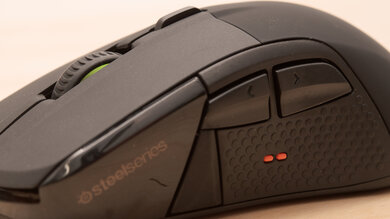
The SteelSeries Rival 710 has a typical button layout with three side buttons, which are right next to the customizable OLED screen. You can remap every button, including both scroll up and down from the wheel. Also, just like other SteelSeries mice, you can map a button to switch to a certain profile, but can't cycle through all of your profiles with the same button, which is disappointing.
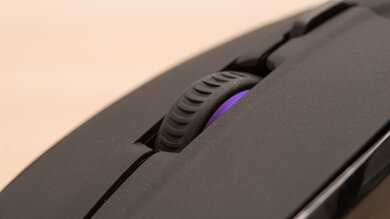
This mouse has a very small scroll wheel that doesn't stick out a lot, like most other SteelSeries mice. It features subtle RGB lighting on its sides and has medium soft increments when scrolling. For a gaming mouse with a scroll wheel that tilts left and right, check out the HyperX Pulsefire Raid.
The click latency of the SteelSeries Rival 710 is very low. This wired mouse feels responsive and even most competitive players shouldn’t notice any lag when playing games. If you want a mouse with an even lower click latency, check out the BenQ Zowie EC2.
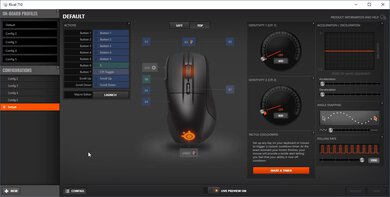
The SteelSeries Rival 710 is compatible with the excellent Engine 3 software. It allows for a lot of lighting and performance customization. You can even set a vibration timer that will alert you in games when some of your abilities are off cooldown.

